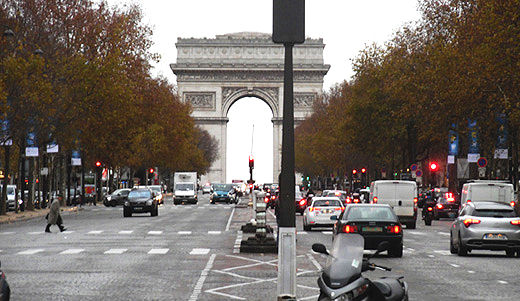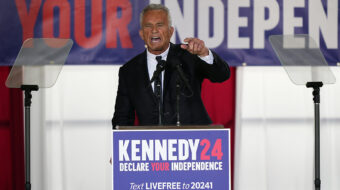
The runoff elections for regional governments in France on Sunday, December 13, produced a defeat for the ultra right, anti-immigrant, anti Muslim National Front of Marine LePen. The National Front did not win control of a single one of the thirteen regions being contested. But the French left is warning that continued vigilance and mobilization will be needed.
The first round of the elections took place on Dec. 6. The shocking result was a sharp advance of the National Front’s candidates in several regions, with the evident danger that the National Front Leader, Ms. LePen and other extremist candidates would actually be elected and thus have access to state resources in major areas of the country. The regional councils are not legislative bodies but they have control over budgets that total billions of dollars for such things as high school education.
The National Front was founded in the 1960s by Marine LePen’s father, Jean-Marie LePen, a former anti-communist street brawler who has also been criticized as an anti-Semite, and for having been involved in torturing prisoners when he served in the military during the Algerian independence war. The elder LePen’s roots are mixed with the monarchist, right-nationalist and proto-fascist traditions of the French right which kept him marginalized for years.
However, Marine LePen has shrewdly pushed her father out of power in the National Front and stopped the anti-Semitic statements while latching onto a more populist narrative which appeals to sectors of the working class who find themselves harmed by the forces of corporate globalization and the European integration institutions that have imposed austerity economics leading to unemployment and declining living standards.
The National Front is “Euro-sceptic” as well as being anti-Muslim and anti-immigrant and skeptical of global warming. It presents itself as standing for ordinary working French men and women whose living standards and national pride are being undermined by foreigners, Muslims, big business concerns that run the European Union, and environmentalists. By this populist appeal the National Front has managed to compete in sectors of the electorate that are normally the constituency of socialists and communists.
Although French communists and their allies in the “Front Gauche” (Left Front) also campaign against big business and see the European Union’s institutions as being rigged against workers and in favor of corporations, they strongly defend the rights of immigrants and Muslims, and oppose NATO and militarism.
At any rate, the surge for the National Front in the first round of the elections on Dec. 6 caused many to take alarm and to redouble their efforts to stop it in the second round. Voter turnout jumped nine percent in the week between the two rounds of the election, from 50 percent to 59 percent. The Socialist Party asked its candidates in key regions to withdraw and throw their support to the right wing (in these regional elections, any candidate who gets 10 percent or more of the vote in the first round can be in the run off, not just the top two vote getters).
In the key Ile de France region, the Socialists, Communists, and Greens formed a united front for the second round.
The strategy of prioritizing the defeat of the National Front bore fruit in the second round. Marine LePen and her party did not win control of a single region. The Socialist Party, Les Republicains and also LePen’s National Front all increased their votes, but the Socialists and the Les Republicains much more that the National Front.
Les Republicains triumphed in seven of the regions of metropolitan France while the socialists retained five. In Corsica a Corsican nationalist party won, while in the French colonies in the Caribbean and Indian Ocean left wing parties won in French Guiana and Guadeloupe while Les Republicains won in the island of Reunion. Overall the Socialists and left won 31.71 percent of the vote; Les Republicains and other right wing groups 40.63 percent, and the National Front 27.36 percent.
So the National Front did not win a single regional government. This throws cold water on the idea that Marine LePen could be a presidential contender in the elections of 2017.
That’s the good news. The bad news is that the Socialist Party lost most of the regional presidencies that it had held going into this election, in all cases to Les Republicains, which, though not fascist, is a right wing anti-worker party itself. Obviously, the withdrawal of Socialist Party candidates in favor of supporting those of Les Republicains has to be a major factor in this.
But there is also widespread disappointment among French working class people in the performance of the government of President Francois Hollande, of the Socialist Party. In the last presidential election he campaigned against the right wing president Nicolas Sarkozy, on a platform of protecting French workers against the austerity programs being imposed on all European countries.
But once in power his government continued to apply some of the same austerity policies, and shocked many by seeming to pander to some the same chauvinistic tendencies that characterize the national front (and Les Republicains). On top of this came the terroristic murders in France culminating with the attack in Paris that left 130 people dead, and panic over the migrant crisis.
Pierre Laurent, the Secretary General of the French Communist Party, pointed out that the “dramatic and alarming” total vote for the National Front is still too high for comfort, and that the real winner of this election was the right wing Les Republicains. “The new situation is not favorable for the world of labor” he added. It is urgent to “get away from austerity and the dogmas of [neo] liberalism.”
Photo: Arc de Triomphe in Paris. | Blake Deppe/PW












Comments